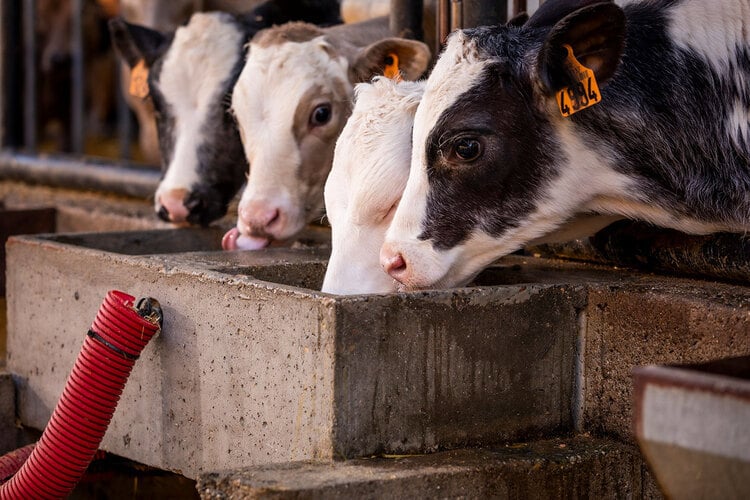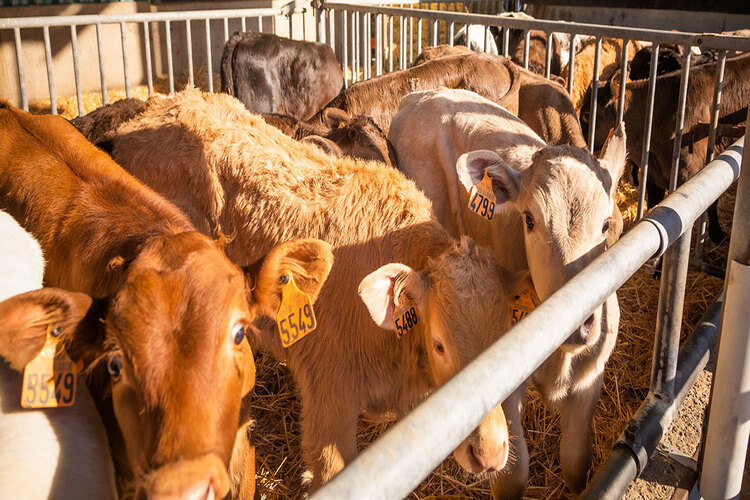
An electrolyte solution with potassium and glycerol increases water intake of feed deprived calves
- LifeStart

Beef calves coming from cow-calf operations are often transported over long distances to feedlots where they are kept until they are ready to be slaughtered. In most beef production systems, these beef calves are around 6 months of age when they are being transported. It is not uncommon for this transport to take 6 hours or longer. While being transported, these animals are deprived of feed and water. The changes induced by water and feed deprivation result in dehydration. To maintain blood plasma volumes at the desired level, water is transported from the intracellular pool into the extracellular pool, resulting in a depletion of potassium levels.
Before and during transport, beef calves from different sources are being mixed, which results in stress and fighting. The feed deprivation in combination with stress and increased activity will deplete glycogen levels in liver and muscle tissues and also induce protein catabolism.
As a result of the combination of stress, dehydration and depletion of energy levels, these animals usually lose bodyweight in the period immediately after transport. The immune suppression resulting from stress and the mixing of animals carrying different respiratory pathogens results in an increase in the incidence of respiratory disease.
Work by de Carvalho and others[1,2,3] suggests that if animals are being supplemented with an oral electrolyte solution (OES) with the correct levels of potassium and glycerol, their water intake goes up, they become less dehydrated and they lose less bodyweight. A trial was carried out to study the effects of a supplement containing potassium and glycerol in bull calves if fed before transport for an extended period of time.
The trial was carried out on a commercial beef farm. Animals were included in the trial immediately after they arrived on the farm. Two groups of bull calves were included in the trial. One group of 737 animals received the supplement with potassium and glycerol mixed into their drinking water at a rate of 4%. The control group of 702 calves was given water only. Calves were weighed upon arrival on the farm and 53 days later.
The average consumption of water per day was 5.83 L/day for the group supplemented with potassium and glycerol vs. 4.60 L/day for the controls.
Calves supplemented with OES grew 8.1 kg more, this difference was close to significance (p= 0.09, see table 1).
|
|
Weight upon arrival |
Weight at 53 days |
Growth |
| Supplement | 70.0 kg | 118.3 kg | 48.3 kg |
| Controls | 68.5 kg | 108.7 kg | 40.2 kg |
Table 1, growth in beef calves supplemented with potassium and glycerol compared to controls getting water only.
Mortality was reduced from 2.85% in controls to 0.95% the group of calves supplemented with the oral electrolyte solution (p=0.08).
In case animals are dehydrated and stressed as a result of transport, their potassium and glycogen reserves have been depleted. Supplementing calves with potassium and glycerol in drinking water immediately after transport resulted in an increase in water intake. This increase in water intake resulted in higher growth and ultimately, a reduction in mortality.
[1] de Carvalho, I.P.C. and J. Martín-Tereso, 2017, Electrolyte and glycerol solution supply to feed deprived bulls before slaughter, Proceedings of the annual congress of the EAAP, Tallin, 68: 384.
[2] Gardner, G.E, McIntyre, B.L, Tudor, GD and D.W. Pethick, 2001, Nutritional influences on muscle glycogen recovery following exercise in sheep and cattle. J. L. Corbett and I. Schmidt, editors, Recent advances in animal nutrition in Australia. University of New England, Armidale, Australia. p. 145–151.
[3] Arp, T.S, Carr, C.C, Johnson, D.D, Thrift, T.A, Warnock, T.M. and T.M. Schaefer, 2001, Effects of preslaughter electrolyte supplementation on the hydration and meat quality of cull dairy cows, Professional Animal Scientist, 27:1, 43-51.